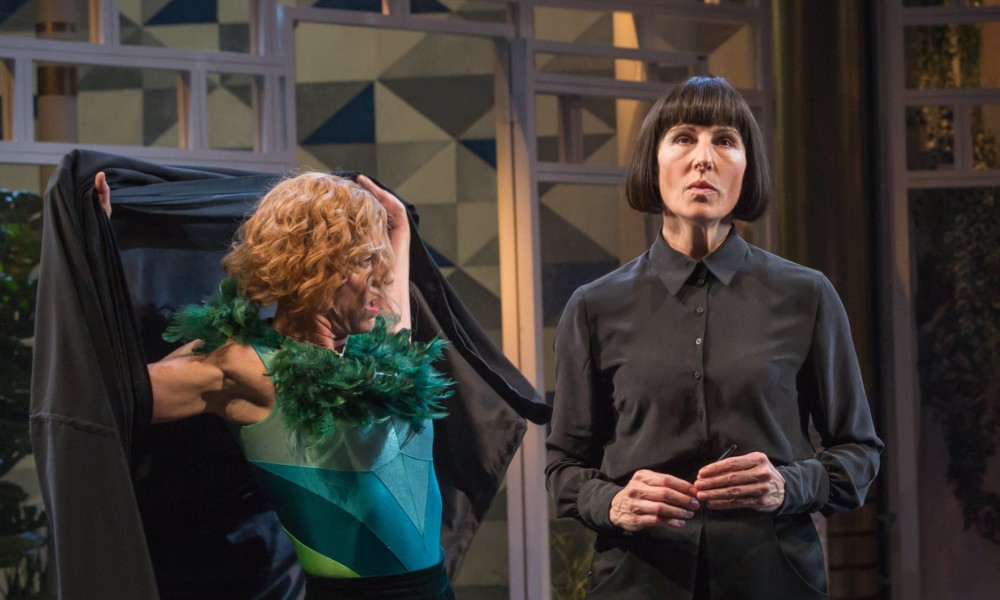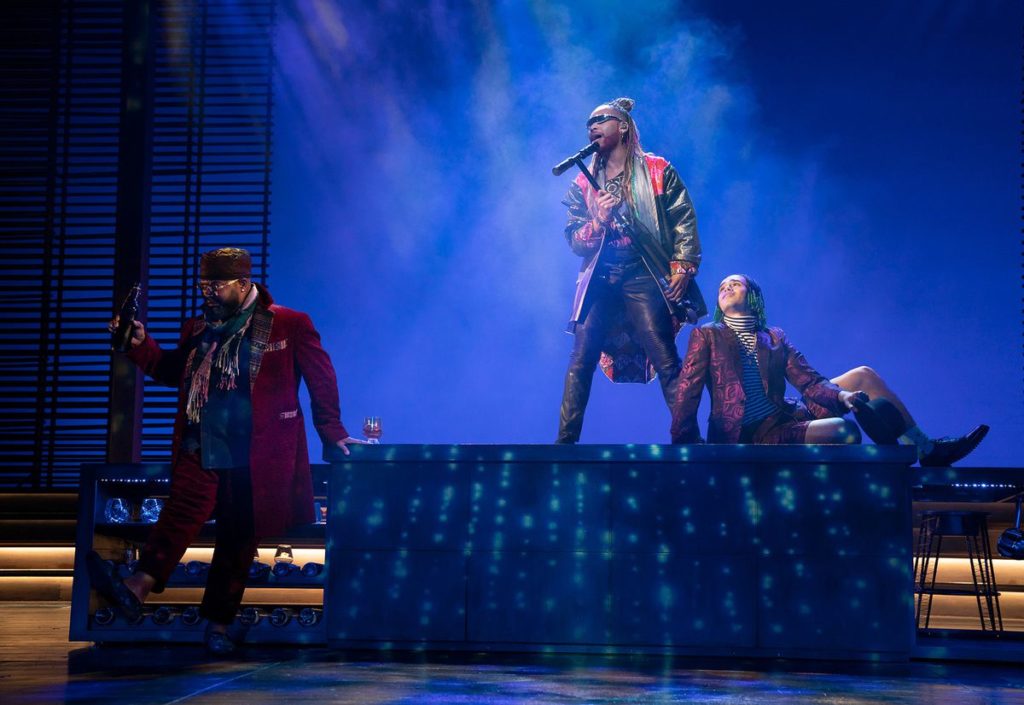
By Hazen Cuyler
Continuing their efforts to battle our theater-deprived quarantine blues, The National Theatre’s showcase this week is William Shakespeare’s Twelfth Night. Directed by Simon Godwin, featuring a fantastic cast and only streaming through April 30, you should catch this necessary piece of theatre before it’s too late.
Set in modern day, Viola and her twin brother Sebastian are separated after a ship wreck. Believing her brother has drowned, Viola disguises herself as a man to gain employment under Duke Orsino. He is in love with Olivia, a beautiful and wealthy countess, and tasks Viola, now called Cesario, with relaying his admiration. Complications materialize as Viola falls in love with Orsino, Ophelia with “Cesario” and her twin brother Sebastian emerges on the scene.
Mr. Godwin wisely incorporates subtle changes within the play’s environments. For example, his production’s opening scene substitutes Orsino awaiting news from Olivia within his palace for Orsino proposing outside Olivia’s front gates, more directly establishing the play’s initial conflict. Later, we find ourselves in an intimate pool area with Cesario, Olivia and others. The expectation for everyone to be in bathing suits further layers suspense; increasing enjoyment to an already engaging scene full of talent.


In the written play, Malvolio is a man and servant to Olivia. He is stuck up and cruel to those beneath him. A trick is played on him and we view it as justifiable punishment for his distasteful behavior. However with Tasmin Greig’s Malvolia, a woman, her punishment offers a fresh perspective, shining light on sexual repression and traumatic emotional abuse. I’ve always seen Malvolio played by a man. Never before have I felt such pangs of heartbreak as from Ms. Greig’s Malvolia.
Neither indulgent nor out of place, the scene in question provides an interim from Twelfth Night’s elevated comedy. Ms. Greig’s Malvolia is a sterile, domineering, hopelessly robotic servant of Olivia. Stumbling upon a love letter, evidently from Olivia, Malvolia is instructed to smile and dress in yellow stockings if she accepts her master’s admiration. The letter is fraudulent, but she adheres to the instructions and meets Olivia in sexy, lemon-yellow tights adorned by a pair of battery-operated spinning tassels. When we see her again she’s blindfolded and bound within a hopeless brick corridor, lit by a single naked lightbulb hanging in the background. Her once vibrant and sexually expressive outfit now clings tarnished and muddied. The oppressive scene is balanced with charm and laughter thanks to Doon Makichan’s commanding work as Feste, Olivia’s fool, pretending to be a priest condemning Malvolia. Through Ms. Greig’s work, we bear the shame of a regretful, shattered woman. An innocent person fettered, stained and lying on cold earth. When the stage revolves to a fresh location in this lavish world, Malvolia sits hunched atop a small stool, floating away as if suspended by air.


Malvolia’s confidential love, for Olivia, leads to her destruction. Malvolia loves Olivia who loves Cesario/Viola who loves Orsino who is working to court Olivia. Sir Andrew loves Tony who loves Maria. Antonio loves Sebastian, kisses him and invites him to a gay club where a drag queen sings a rendition of Hamlet’s “To Be or Not To Be” speech. Viola’s infatuation is secret. Orsino hides his love for Cesario. When Orsino kisses Cesario on the lips, we posit the peck may be more than platonic.
As Viola’s confident alter-ego Cesario, Tamara Lawrence unearths boyish machismo and camaraderie while under constant threat of being discovered. Ms. Lawrence loses neither Viola’s soft femininity nor her bold sexual attraction to Orsino. During his birthday party, Viola not-so-subtly licks his shoulder delivering momentary relief from the caged-in sexual energy pervading this entire production. Near the play’s conclusion, tightly strung tension finally snaps and Ms. Lawrence leaps into Orsino’s arms, cheered on by an adoring audience.


All this bursting amorous energy is contained within Soutra Gilmour’s multi-layered folding triangle set of architectural fascination—an Art Deco arrowhead accentuated by wealth. Windowed walls make worlds extend forever; hospitals contain countless roaming doctors and beds. A stairway strides to eternity. A grey cement barrier reinforces Olivia’s honeycomb home where every corridor reveals a new, opulent habitat.
At the beginning, Malvolia is an emotionally tethered person. Tightly held and incapable of venturing beyond her self-imposed captivity. A servant dogmatically rejecting freedom. Then, drastic misfortune strikes; A mean-spirited trick masquerading as jest derails the conventions of her old way of life. Although an isolating experience, necessity inspires opportunity to transcend her dissatisfaction. Survival desiring more than a compromised existence. An opportunity to live again, for the first time, as rain washes over us all.
The National Theatre’s production of Twelfth Night. 2 hour 40 minutes with a very brief intermission. Streaming free on YouTube through April 30. https://youtu.be/aig5ObghHS4
Photos: Andy Parsons & Courtesy of the National Theatre






















